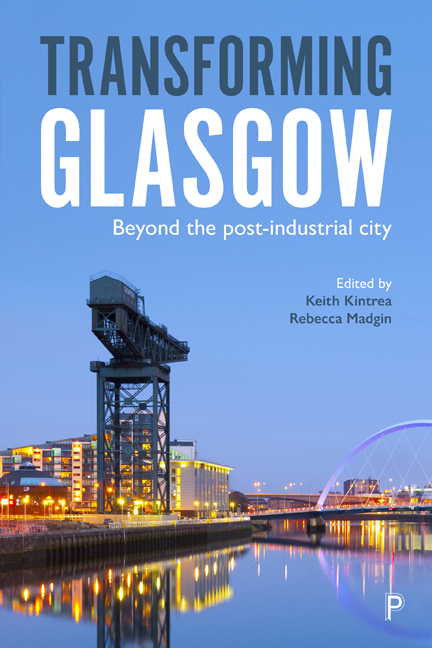Book contents
- Frontmatter
- Contents
- List of Maps, Tables, Figures and Boxes
- Notes on Contributors
- Acknowledgements
- Foreword
- Map
- Introduction: Transforming Post-Industrial Glasgow – Moving Beyond the Epic and the Toxic
- PART I
- PART II
- PART III
- Conclusion: Beyond the Post-Industrial – Narratives of Time and Place
- Index
1 - The Policy Discourses that Shaped the ‘Transformation’ of Glasgow in the later 20th Century: ‘Overspill’, ‘Redeployment’ and the ‘Culture of Enterprise’
Published online by Cambridge University Press: 25 March 2021
- Frontmatter
- Contents
- List of Maps, Tables, Figures and Boxes
- Notes on Contributors
- Acknowledgements
- Foreword
- Map
- Introduction: Transforming Post-Industrial Glasgow – Moving Beyond the Epic and the Toxic
- PART I
- PART II
- PART III
- Conclusion: Beyond the Post-Industrial – Narratives of Time and Place
- Index
Summary
Introduction
Discussion of the ‘transformation’ of the first-generation industrial cities of Europe and North America is tightly linked to understandings of their ‘industrial decline’. Commonly, this latter process is presented in terms of the declining ‘competitiveness’ of these cities as the post-1970 liberalisation of international trade, and improving communications, changed the global economic order. With ‘traditional’ industries collapsing, the challenge was for cities to make the ‘transition’ to ‘postindustrialism’, in which the service sector – and particularly, retail, leisure, tourism and the arts and culture – would assume a much larger role (see Tallon, 2013). Crucially, for the purposes of this chapter, this ‘transition’ is commonly seen as one which was fundamentally induced by the force of economic circumstances, rather than being chosen, or driven, by governments.
This chapter provides important context for the rest of this book by showing how significantly Glasgow's trajectory from industrialism to post-industrial city differed from this ‘standard’ view. It draws on extensive research in government archives, originally conducted to inform a larger project seeking to account for Glasgow's ‘excess mortality’ (Walsh et al, 2017). The research covered the retained official records of both the Scottish Office and the Cabinet Office of the UK Government, for the period from 1945 until the early 1990s. The evidence from these records shows that Glasgow's industrial decline and the associated policy responses in pursuit of post-industrial ‘transformation’ were driven, not by the impersonal operation of economic processes associated with ‘globalisation’, but rather by the sustained application of a highly discriminatory policy agenda within Scotland. Glasgow's industrial decline was in fact actively embraced and accelerated by Scottish policy makers from the early 1960s, as part of a wider regional economic policy agenda seeking ‘development and growth’ in other parts of Scotland. This policy agenda was to be largely sustained for decades and was to have seriously adverse consequences for the city and its citizens. The subsequent embrace by Glasgow's civic leaders of a post-industrial trajectory reflected their attempt to work within the parameters of acceptability set by the much more powerful policy makers in Edinburgh. Ultimately, it is proposed that an appreciation of all of this is essential to any consideration of the range of policy responses which would be appropriate in supporting the city and its citizens in the future.
- Type
- Chapter
- Information
- Transforming GlasgowBeyond the Post-Industrial City, pp. 21 - 38Publisher: Bristol University PressPrint publication year: 2019

